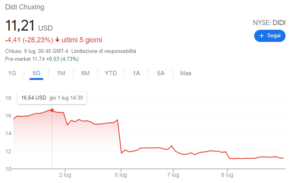

Some major investors say that until the dust settles, it’s too soon to be betting on Chinese tech.

“In such an environment, the owners of capital-especially if they are foreign-will be last in the queue to claim their rewards.”

“The Chinese Communist Party is master of all it surveys, and if the ready conclusion from the past few weeks is that socialist ideology has become a much more significant market factor, how could equity investors value that?” said Diana Choyleva, chief economist at Enodo Economics.Ĭhina is entering a new phase of development, in which growth will give way to a redistribution of wealth and income, she said. Some say that as a long-term bet, China is only for the brave. The past few months have disproved that theory, leaving investors without an obvious playbook. But that strategy assumed that Beijing would leave tech giants alone to thrive and rival the West, Gertken said. “But it does not have to be like this.” “Last in the queue”īefore the crackdown, global investors saw Chinese tech as a way to tap into the country’s rising incomes, which first manifested as soaring demand for consumer products-from running shoes to rice cookers-and later as mass adoption of mobile payments channels and social media platforms. Investors in Chinese equities “may feel like they are standing in front of a train wreck,” wrote John Woods, Credit Suisse’s chief investment officer for Asia, last week. Nearly a year after Beijing launched its attack on Big Tech in earnest with the scuttling of Ant Group’s IPO, the question facing investors is whether to buy into the “uninvestable” mindset-forgoing opportunities from the vast amount of research and development spending taking place in one of the world’s fastest-growing major economies-or learn to follow Beijing’s lead and stack their portfolios with companies that are on the party’s good side. It wants more safeguards for workers, consumers, and the country’s youth. Beijing seems to value small businesses over corporate behemoths and favors new technologies like electric vehicles, clean energy, and biotech over the “platform” companies that earned President Xi Jinping’s ire. It’s easy to see why Goldman’s clients were so worried.īut as the crackdown progresses, the Communist Party is dropping more clues about its priorities. It’s all in the name of limiting what the government sees as the companies’ monopolistic power-a perceived threat to Communist Party rule-and eliminating social inequality that can lead to public discontent. It banned its booming ed-tech industry from making profits and kneecapped video game makers like Tencent by restricting children’s screen time.
#DIDI KEEP XIMALAYA LINKDOC IPOTIMES DRIVERS#
(Didi denies the report.) The government ordered Didi, shopping platform Meituan, and e-commerce giant Alibaba to rectify past misconduct that interfered with fair competition and hurt drivers and passengers. and is now reportedly looking to take the firm under state control. Authorities suspended new sign-ups for Didi Global after the ride-hailing giant went public in the U.S. The government has hamstrung some of its largest homegrown tech stars, restricting or even forbidding them from operating their most promising business lines. But the prospect of China now being a no-go zone reflects just how much the regulatory campaign has spooked investors. The world’s second-biggest financial market after the U.S.-one the IMF expects to grow faster than almost any other major economy this year-looked like a surefire opportunity for investors up until Beijing started cracking down on Big Tech. The idea that investors should avoid the Chinese market would have been unfathomable even a few months ago.


 0 kommentar(er)
0 kommentar(er)
